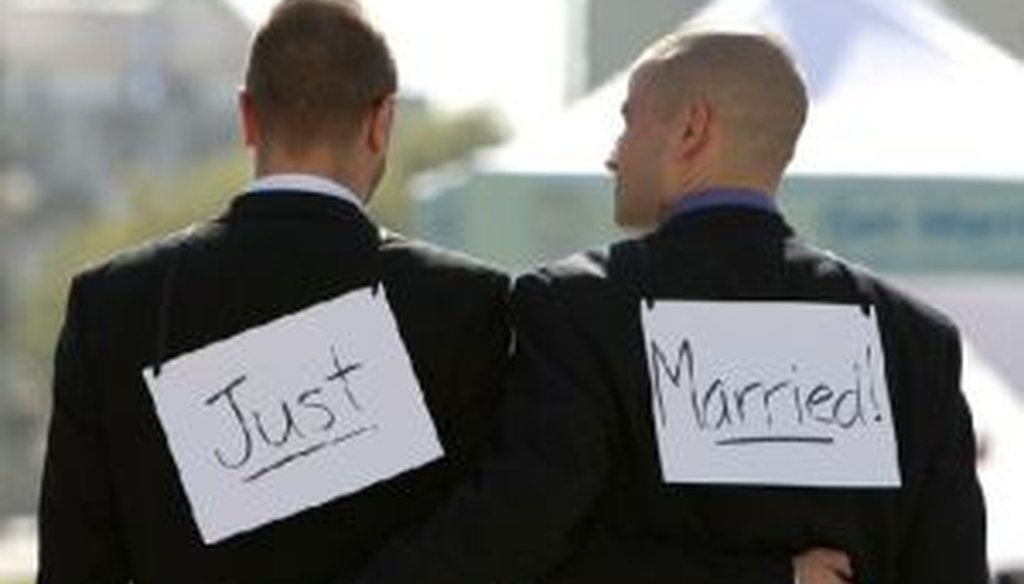Stand up for the facts!
Our only agenda is to publish the truth so you can be an informed participant in democracy.
We need your help.
I would like to contribute

Two key cases on same-sex marriage are set for oral arguments at the Supreme Court this week.
This week will be pivotal for the future of marriage in the United States.
On March 26, the Supreme Court will hear oral arguments on a challenge to California's Proposition 8, a voter-passed initiative that defines marriage in California as only between a man and a woman.
The next day, the justices will hear arguments on a challenge to the Defense of Marriage Act, a 1996 law that defines marriage as between a man and a woman for the purposes of federal law. DOMA, as it is commonly known, also allows states to refuse to recognize same-sex marriages performed in other states.
Sign up for PolitiFact texts
The two cases "have much in common," said Vik Amar, a law professor at the University of California (Davis) who hasn’t been involved in the cases. "Both cases ask the basic question: How skeptical should courts be under equal protection principles about laws that discriminate against gays and lesbians?"
The cases take place against a backdrop of striking reversals in public opinion about same-sex marriage. In 2004, more than 60 percent of those surveyed said same-sex marriage should be illegal, according to the ABC News-Washington Post poll. By this month, the numbers were almost perfectly reversed, with 58 percent saying it should be legal.
Currently, nine states allow same-sex marriages: Connecticut, Iowa, Maine, Maryland, Massachusetts, New Hampshire, New York, Vermont and Washington state, plus the District of Columbia. Another nine -- California, plus Colorado (effective May 1), Delaware, Hawaii, Illinois, Nevada, New Jersey, Oregon, and Rhode Island -- provide same-sex spousal rights, often through civil unions.
Experts say the two cases under consideration could lead to a wide array of decisions from the justices -- we counted six separate conclusions the court might reach.
Let’s take a look at the two cases.
The DOMA case: United States vs. Windsor
Edith "Edie" Windsor lived with Thea Spyer for 44 years, and the couple was married in Canada in 2007. After Spyer’s death in 2009, Windsor had to pay taxes on her spouse’s estate rather than inheriting it outright. as mixed-gender married couples routinely do. Windsor sued the government, arguing that DOMA was unconstitutional because it violated the Constitution’s equal protection clause by recognizing heterosexual couples’ marriages but not those of same-sex couples.
In an unusual but not unprecedented move, the U.S. Department of Justice under President Barack Obama has declined to defend the law. So DOMA’s case is being taken up by lawyers hired by a panel of the Republican-controlled House of Representatives.
The Prop 8 case: Hollingsworth vs. Perry
In 2009, two same-sex couples -- Kristin Perry and Sandra Stier, and Paul Katami and Jeffrey Zarrillo -- were denied marriage licenses after passage of Proposition 8 in November 2008. The two couples sued, claiming that the Constitution’s equal protection clause prohibits the State of California from defining marriage as the union of a man and a woman.
In situation similar to the Obama administration and DOMA, the administration of California’s Democratic governor, Jerry Brown, has declined to defend the law. Instead, a group that supported the original ballot initiative is defending the decision.
Some key legal issues
• Is there a fundamental right to marry? Those who oppose marriage for same-sex couples argue that society has an interest in drawing distinctions because married couples can procreate. Supporters of same-sex marriage reject that view. "I think a critical line of questions, perhaps from Justice Anthony Kennedy, about the purpose of marriage, will shed a great deal of light on the court's thinking about the cases," said Chapman University law professor John Eastman, who has filed amicus, or friend-of-the-court, briefs siding with the supporters of DOMA and Prop 8.
• What is the proper balance in powers between the federal government and the states? Both cases touch on this question. "States' rights supporters could conceivably think that the federal government should defer to each state's decision on same-sex marriage, in which case Ms. Windsor wins her case and the Prop. 8 plaintiffs lose theirs," Amar said.
Historically, the idea that the federal government has overstepped its mandate in relation to state powers has been attractive to conservative justices, so the possibility of that rationale being used in this case in service of a liberal policy goal is considered noteworthy.
• What level of "scrutiny" should be provided for equal protection? Supporters of marriage equality argue that laws discriminating against lesbians and gay men should be subjected to "heightened scrutiny," meaning the government must put forth a compelling and specific need for the discrimination. Heightened scrutiny already exists for racial and gender discrimination, which are "presumptively unconstitutional," but applying heightened scrutiny to sexual orientation would be a first, said Dale Carpenter, a University of Minnesota law professor who has filed an amicus brief in support of overturning DOMA.
The justices could still overturn DOMA without going that far, instead using the a less-stringent standard called "rational review," which means a lack of a rational reason to justify discrimination. Going that route would provide supporters of same-sex marriage with a less powerful precedent for future cases.
What are some of the justices’ options for deciding the cases?
• Option 1: Uphold both Prop 8 and DOMA. Upholding both laws would be a serious strike against same-sex marriage. The status quo would stand -- no same-sex marriage in California, and no federal recognition of same-sex marriage. Supporters of marriage equality would need to start their judicial quest anew and hope for a better result next time.
• Option 2: Punt, citing questions of "standing." The justices could decide that the backers of Prop 8 (or possibly DOMA) aren’t the right parties to defend the law -- a route the Supreme Court took a few times while grappling with the legality of interracial marriage before deciding the issue in 1967 in Loving vs. Virginia, said Kermit Roosevelt, a University of Pennsylvania law professor who has filed an amicus brief arguing that DOMA has a negative impact on child welfare. This sort of ruling would amount to kicking the can down the road.
• Option 3: A mixed decision. "It's possible for the Court to strike down DOMA without even considering the question of whether this a constitutional right to same-sex marriage, because defining marriage is beyond the power of the federal government, regardless of whether there is any individual right involved," said Ilya Somin, a George Mason University law professor who signed an amicus brief making that argument.
• Option 4: Support same-sex marriage on very limited grounds. For instance, the court could rule that any state that had once allowed same-sex marriage can’t take it away. This would make same-sex marriage legal in California, the only state for which this condition applies, but the ruling wouldn’t be applicable in other cases.
• Option 5: Support same-sex marriage in a more middle-of-the-road fashion. The court could rule that if states have civil unions that are legally identical to marriage, then they cannot deny the label "marriage" to same sex couples. This would affect eight states -- the right states that currently have spousal rights short of marriage -- plus California.
• Option 6: Support same-sex marriage everywhere all at once. The justices could go for a major shift in one fell swoop by announcing that there is a right to same-sex marriage in all 50 states. This would be a huge decision that would essentially settle the debate.
Meanwhile, any decision that struck down DOMA would have significant consequences very quickly, said Hayley Gorenberg, the deputy legal director of Lambda Legal, the largest national legal organization focused on challenging discrimination against lesbian, gay, bisexual, and transgender individuals. Such a decision "would allow married couples a host of federal benefits and responsibilities," she said.
If the justices agree on a 50-state solution, the issue will most likely be settled. But any ruling short of that could mean that the political and legal battles continue, to one extent or another. Any other ruling "is likely to be a placeholder until other cases force the court to say more in the next handful of years," Amar said.
Our Sources
See original stories










































